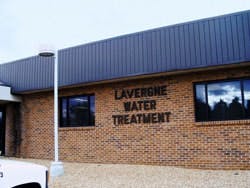Public-Private Partnership Yields Better-Tasting Water, Regulatory Compliance
| Related Searches from WaterInfoLink.com Public-Private Partnership | Onsite Sodium Hypochlorite Generation | Severn Trent Services | La Vergne, Tennessee |
La Vergne, Tenn., is one of the fastest-growing communities in the country. Located about 20 miles southeast of Nashville and the intersection of three interstate highways, the city has attracted several international retail chains in recent years and a number of major industrial companies. Since 2000, the population has increased by more than 40%, standing now at about 27,000 residents.
La Vergne’s drinking water is provided by the La Vergne Water Plant, a 9.8-million-gal-per-day surface water treatment plant that utilizes multimedia filtration, onsite sodium hypochlorite generation for disinfection, sodium permanganate addition for manganese removal and polyphosphate injection for corrosion control. Anticipating the city’s growth shortly after the 2000 census, the La Vergne Water Department doubled the treatment plant’s capacity in 2004 and 2005.
While the availability of drinking water was not a problem after the plant’s expansion, the Water Department was fielding an average of 20 complaints a month from customers regarding their water’s taste and odor, drawing citations from the Tennessee Department of Environment and Conservation. In 2007, the city sought to improve the operation of the treatment plant to ensure high-quality water for residents and businesses by entering into a public-private partnership with Severn Trent Services for operation of the plant.
Significant maintenance needs were identified at the start of the relationship, and Severn Trent and the city worked diligently to return the equipment to optimum condition. A filter profile was performed that showed the filters were frequently running low on the granular activated carbon media. In some cases, as much as 2 ft of media was missing. Excessive backwashing of the media was identified as the primary cause of media loss, so Severn Trent upgraded the filters by adjusting their valve timing and restored the proper media level, which reduced the amount of backwashing and associated water usage.
Severn Trent operations and maintenance staff also discovered that higher-than-expected levels of organic material were remaining in the water as it emerged from the plant’s clarifiers. The staff drained, cleaned and inspected two of the plant’s four clarifiers, which significantly increased the efficiency of the initial particle removal process. In addition, the improved effectiveness of the clarifiers enabled the use of less chemical disinfectant. The plant had been using aluminum sulfate to supplement the work of the clarifiers, but switched to less costly poly-aluminum chloride shortly after the two clarifiers were cleaned. Work continues on the remaining two clarifiers.
Process modifications also were implemented to improve water quality and restore compliance. Plant personnel determined that increasing chlorination midway through the treatment process would effectively address taste and odor problems and decrease the need for activated carbon. Then, in early 2009, the staff substituted sodium permanganate for the chlorine, which enabled the plant to comply with disinfection byproduct regulations. The effectiveness of this approach has virtually eliminated taste and odor complaints.
The plant staff determined that other chemicals had been overused. In one instance, Severn Trent was able to cut the alum dosage in half without negatively impacting water quality. The city benefited by keeping its chemical costs stable, even during a year in which costs increased. Since it pays directly for all chemicals, the city essentially avoided the cost of the price increases. In addition, turbidity has been reduced by 50% because of reduced chemical usage and the filter upgrades.
Overall the professionalism of the plant staff and the quality of the plant’s process and safety procedures have improved since the beginning of the public-private partnership. Two of the plant’s operators have increased their certification to Grade 2 and Grade 4. And the addition of needed health and safety equipment and supplies and the implementation of a new safety training program have brought the facility up to OSHA standards.
Current maintenance projects include the rehabilitation of a reverse osmosis system used to recover backwash water and a coupon study to confirm the effectiveness of the plant’s corrosion control program.
While maintenance expenditures during the first two years of the plant’s operations have been significant, the city fully expects future maintenance requirements to normalize through implementation of Severn Trent Services’ predictive and preventive maintenance programs. The city has rewarded Severn Trent’s performance by renewing its contract eight months in advance of the initial contract’s expiration and has expanded the scope of work to include cross-connection inspections.
